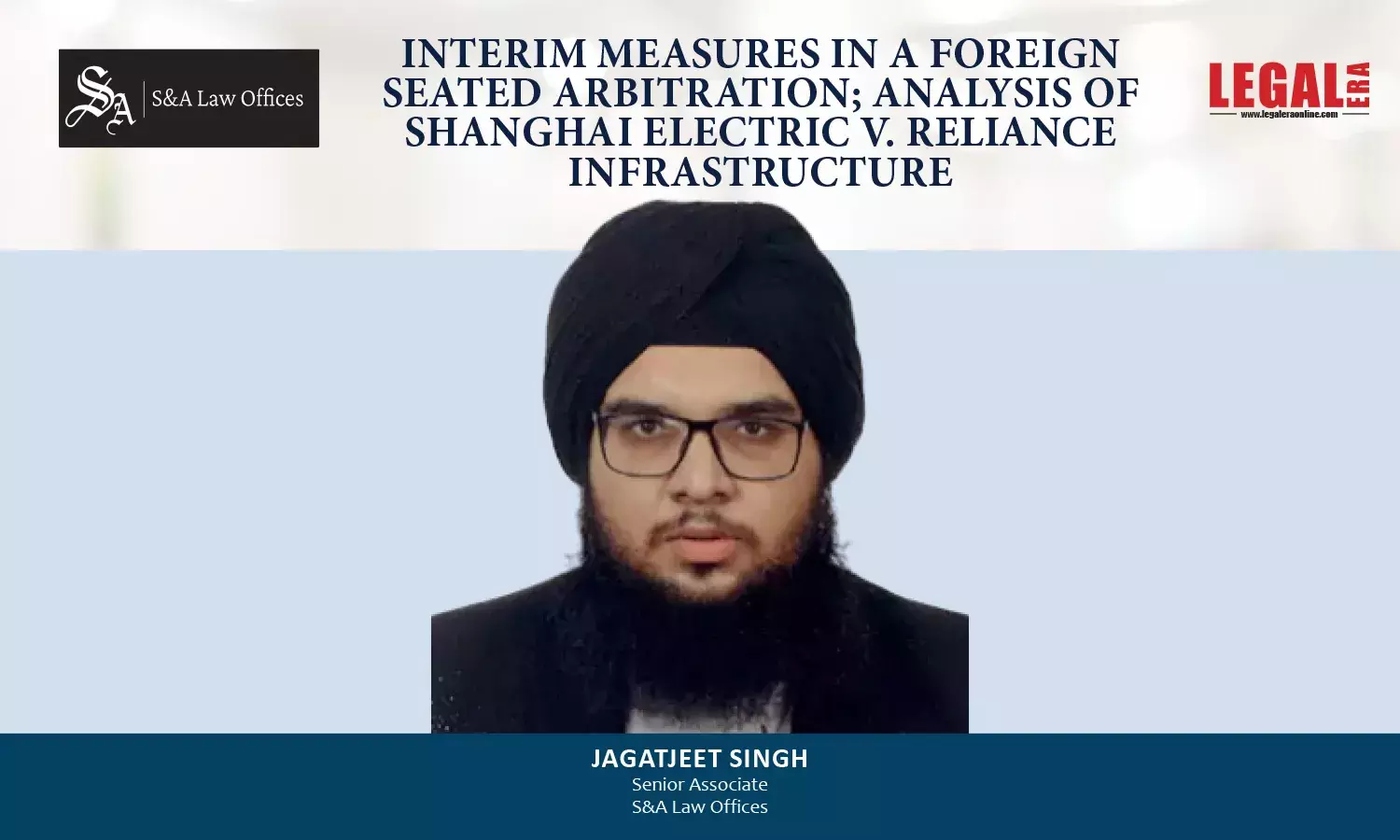Interim Measures In A Foreign Seated Arbitration; Analysis Of Shanghai Electric v. Reliance Infrastructure

Interim Measures In A Foreign Seated Arbitration; Analysis Of Shanghai Electric v. Reliance Infrastructure
Jagatjeet Singh1
In the dynamic landscape of international commerce, disputes are inevitable. When parties from different jurisdictions enter into contracts, disagreements may arise, leading to complex legal disputes. In such a scenario, arbitration emerges as a preferred method for resolving disputes, offering flexibility, neutrality and enforceability across borders. India, with its burgeoning economy and increasing global engagements has become a focal point for international business transactions. Consequently, use of arbitration, both domestic and international, as a means of dispute resolution is on the rise. This article aims to delve into the nuances of interim measures that may be sought in India in foreign seated arbitrations. It will explore the legal framework, procedural intricacies and recent judicial developments surrounding the grant and enforcement of interim measures by the Courts in India.
Interim measures play a pivotal role in any legal proceeding, including arbitrations. It is paramount in the interest of all the parties involved that the subject matter of the dispute is protected from being siphoned off or vitiated during the arbitral proceedings. In the Indian seated domestic and International Commercial Arbitrations, parties can seek interim measures from the “Court” under Section 9 of the Arbitration & Conciliation Act, 1996 (hereinafter referred to as “A&C Act”) or seek interim measures from the Arbitral Tribunal under Section 17 of the A&C Act. A Petition under Section 9 of the A&C Act can be filed before the appropriate Court at any time before or during the arbitral proceedings or at any time after passing of the award but before the same is enforced. On the other hand, the application under Section 17 of the A&C Act can only be filed once an Arbitral Tribunal has been constituted and can only be decided by the said Arbitral Tribunal.

2015 Amendment to the A&C Act w.r.t. foreign seated International Arbitrations
On 31.12.2015, the Hon’ble President of India gave its assent to the Arbitration & Conciliation (Amendment) Act of 2015. The said amendment in Section 2 of the A&C Act added the following proviso, which, inter alia, was deemed to have retrospective force:
‘Provided that subject to an agreement to the contrary, the provisions of sections 9, 27 and clause (a) of sub-section (1) and sub-section (3) of section 37 shall also apply to international commercial arbitration, even if the place of the arbitration is outside India, and arbitral award made or to be made in such place is enforceable and recognised under the provisions of Part II of this Act’2
The addition of the aforesaid proviso in the A&C Act meant that petitions under Section 9 of the A&C Act could be filed by parties in an International Commercial Arbitration seated outside India, to protect the subject matter of the dispute even in foreign seated International Arbitrations.
Pre 2015 Amendment to the Section 2 of the A&C Act
Before the A&C Act was amended, Part I of the A&C Act applied only to arbitrations, both domestic and international, which had their juridical or legal seat within the territory of India.
However, the Hon’ble Supreme Court in case titled ‘Bhatia International v. Bulk Trading S.A. & Anr.’3 in 2002 and in case titled ‘Venture Global Engineering v. Satyam Computer Services Ltd. & Anr.’4 in 2008 held that Part I of the A&C Act shall also apply to International Commercial Arbitrations situated outside the territory of India.
This position was over turned by a five-judge bench of the Hon’ble Supreme Court of India in the case titled ‘Bharat Aluminium Company v. Kaiser Aluminium Technical Services’5 wherein the Hon'ble Court held ‘there was no existing provision under the Civil Procedure Code or under the Arbitration & Conciliation Act, 1996 for a Court to grant interim measures in terms of Section 9, in arbitrations which take place outside India, even though the parties by agreement may have made the Arbitration Act, 1996 as the governing law of arbitration.’ The Hon’ble Supreme Court further stated that no application for interim relief or no suit for interim injunction was maintainable in India with respect to a foreign-seated International Commercial Arbitrations, making Part I of the A&C Act inapplicable to foreign-seated International Commercial Arbitrations. The Hon’ble Supreme Court noted that the judgments in the cases of Bhatia International (Supra) and Venture Global Engineering (Supra) had been decided in 2002 & 2008, respectively, and had been relied upon by various High Courts and litigants. In the interest of justice, the Hon’ble Supreme Court made it clear that its observations shall apply prospectively to all arbitration agreements executed thereafter i.e., from 06.09.2012.
Post 2015 Amendment of Section 2 of the A&C Act
The addition of the proviso by way of Amendment of the A&C Act, makes Part I of the A&C Act applicable to foreign-seated International Commercial Arbitrations and as enables the parties to seek interim measures under Section 9 of the A&C Act from Indian Courts. The said amendment addresses the vacuum observed by the Hon’ble Supreme Court in Bharat Aluminium (Supra), i.e., absence of any provision under the Code of Civil Procedure or the A&C Act to grant interim reliefs in foreign seated International Commercial Arbitrations.
The Hon’ble High Court of Delhi in case titled ‘Raffles Design International India Private limited & Anr. v. Educomp Professional Education Limited & Ors.’6 in a petition filed under Section 9 of the A&C Act held that the petition fell under exception to Part I of the A&C Act. The counsel for the respondent argued that the arbitral proceedings as under Section 26 of the A&C Act had commenced before the 2015 amendment of the A&C Act on 23.10.2015. However, the Hon’ble High Court held that ‘the rights of the parties for resolution of disputes were crystallised when they agreed for resolution of the disputes by arbitration and not when the arbitration agreement was invoked’. Furthermore, Respondent had also raised an issue against the maintainability of the petition on the ground that the parties impliedly agreed to exclude Section 9 of the A&C Act on account of approaching the SIAC tribunal for seeking the same relief and having obtained a judgment in terms of the interim order. The Hon’ble High Court held that unlike Article 17H of the UNCITRAL Model Law, the A&C Act did not contain any provision for enforcement of interim orders granted by an Arbitral Tribunal outside India.
Case study Of Shanghai Electric Group Co. Ltd. v. Reliance Infrastructure Ltd.7
Shanghai Electric, a company incorporated in the People’s Republic of China, entered into an Equipment Supply and Service Contract with Reliance UK in relation to erection and commission of six units of boilers, turbines and generators for coal-fired super critical thermal ultra-mega power project at Sasan, Madhya Paradesh. Reliance Infrastructure, a company incorporated in India, issued a Guarantee letter dated 26.06.2008, guaranteeing Reliance UK’s due performance of all, including payment, obligations under the Contract. The last consignment supplied by Shanghai Electric was on 23.11.2017 however till August of 2019, Shanghai Electric was owed $135,320,728.42 (approximately Rs. 995 Crores). Shanghai Electric invoked arbitration against Reliance Infrastructure and the arbitral proceedings commenced in Singapore under Singapore International Arbitration Centre (SIAC) and United Nations Commission on International Trade Law (UNCITRAL) rules. Shanghai Electric, during the pendency of the arbitral proceedings, noticed that Reliance Infrastructure were hurriedly dissipating its assets to deprive Shanghai Electric the fruits of the arbitral award likely to be passed in its favour. Thus, Shanghai Electric filed a petition under Section 9 of the A&C Act against Reliance Infrastructure before the Hon’ble High Court of Delhi.
In the said petition, Shanghai Electric sought interim measures for securing the amount under dispute in the arbitration, payable in terms of the Guarantee Letter dated 26.06.2008 by Reliance Infrastructure along with injunctive reliefs restraining Reliance Infrastructure from selling, transferring or otherwise disposing of and/or creating any encumbrances on its assets during the pendency of the arbitral proceedings.
Reliance Infrastructure argued that the parties had agreed to exclude the applicability of Section 9 of the A&C Act by having agreed to a foreign-seated international arbitration under UNCITRAL rules and applicability of English Law. The Hon’ble Court however held that ‘mere conferment by parties to arbitration governed by UNCITRAL Rules would not amount to ouster/ exclusion of the applicability of Section 9’.
Reliance Infrastructure further argued the non-maintainability of the petition filed under Section of the A&C Act by placing reliance on Section 9(3) of the A&C Act which states that the Court shall not entertain an application under sub-Section (1) of Section 9 after the constitution of the Arbitral Tribunal, unless circumstances exist which make the remedy under Section 17 non efficacious. Shanghai Electric countered and stated that it will not be efficacious for it to obtain interim protection from the Arbitral Tribunal, as such an order, even if granted is not directly enforceable by the Courts in India. It further submitted that there is no provision under the A&C Act for enforcement of foreign interim orders, the Act only contemplates the enforcement of foreign awards and not foreign interim orders.
The Hon’ble Court refuted the contentions of Reliance Infrastructure and differentiated the present case from Ashwani Minda’s case8. The Hon’ble Court observed that in Ashwani Minda, an Indian party had sought injunction/ relief against a Japanese corporation where the Court did not have natural/ personal jurisdiction. However, in the present case the injunction/ relief is sought by a Chinese corporation against an India party, whose assets are located in India. The Hon’ble Court referred Raffles Design (Supra) wherein the Hon’ble Court had held that as A&C Act did not have any provision for enforcement of interim orders, as such seeking an interim relief/ injunction from a foreign-seated Arbitral Tribunal would not be an efficacious remedy. Therefore, the Hon’ble Court held that the remedy under Section 9 of the A&C Act is available to Shanghai Electric.
On the merits of the case, the Hon’ble Court was not inclined to grant any interim relief as the award of the Arbitral Tribunal was awaited. The Court observed that the financial condition alone could not be reason to justify the relief of attachment before judgment against Reliance Infrastructure. Thus, the Hon’ble Court held that there was nothing in the petition to compel the Court to put restraint upon the dissipation of the assets of Reliance Infrastructure and dismissed the petition stating that its view are tentative and shall not influence the Arbitral Tribunal.
Conclusion
The law on the maintainability of interim measures sought by parties of a foreign-seated international commercial arbitration has evolved through the years. The Arbitration & Conciliation Act today has made room for both Indian and foreign parties to seek interim reliefs and injunctions under Section 9 of the A&C Act where assets for which or against which relief is sought, is within the jurisdiction of the Court. However, the said petitions are tested under the same law of the land and shall meet the same requirements under Section 9 of the A&C Act as a domestic arbitration for a Court to grant interim reliefs/ injunctions.
2. Section 2(2) of the Arbitration & Conciliation Act, 1996
3. (2002) 4 SCC 105
4. (2008) 4 SCC 190
5. (2012) 9 SCC 552
6. 2016 SCC OnLine Del 5521
7. 2022 SCC OnLine Del 2112
8. Ashwani Minda v. U-Shin Limited, (2020) SCC OnLine Del 1648

